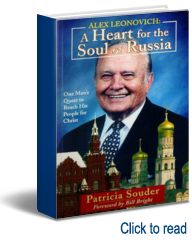


 |
Pray that God will fill the Slavic believers with a hunger for His Word: "Desire the sincere milk of the Word" (1 Peter 2:2), and a spirit of prayer: "Pray without ceasing" (1 Thessalonians 5:17). Ask God to call many young men and women to serve Him sacrificially and sincerely in places of leadership. Pray that some will choose to serve in other Slavic countries as missionaries. Intercede for the Christian leadership in Eastern Europe that they will withstand the powers of darkness and remain stable in their spiritual roles. |

Alex Leonovich, a native of Russia, ministered in missionary, pastoral and evangelistic work since 1945. He was at the forefront of evangelistic broadcasting into the former Soviet Union by way of HCJB in Quito, Ecuador. As the Executive Director of Slavic Missionary Service International, Alex had an extensive outreach to the Slavic speaking world both home and abroad.
Before accepting the leadership of Slavic Missionary Service in 1958, he served as pastor of two American Russian-Ukrainian churches simultaneously for almost five years. He was marked as a "fiery youth missionary preacher” in both the Russian and English languages by his peers. After taking on the responsibility of SMS, he continued to pastor the Emmanuel Baptist Church in Manville, NJ until he resigned in 1970 to devote more time to the mission’s endeavors.
SMS is grateful to God for the faithful and fervent leadership of Alex Leonovich from 1958 until March of 2013. SMS is happy to share some of Alex’s past articles to encourage all to support the mission, as we continue to work in Slavic countries and reach Slavic people throughout the world.
OUR MISSION IN LIFE
If it were possible for me to describe my life with one word, I would choose the word "mission." This speaks of purpose and commitment. It speaks of dependence upon the mighty power of God, for what can an instrument do of itself unless it be in the hands of the Master Worker. Who am I that I should be entrusted with so great a task and responsibility as that of "Christ's Ambassador" in the world in which I live?
I find great comfort when, in studying the Scriptures, I look upon those whom the Lord chose to be His representatives. They were poor; they were without position. They did not have influence or the kind of education that people today would associate with great leaders. Yet, these men were destined to play a great role not only in their world but also in the lives of generations that would follow. They were indeed destined for unique greatness.
Amidst much misunderstanding, abuse and hatred on the part of the people who rejected the person of Christ, these disciples followed their Lord. They absorbed the truth and purity of His words. They were dazzled by the unusual and magnificent demonstration of His power. They were dumbfounded and shocked by the horror of His death. Suddenly, their faith became renewed and their life recharged with hope, as they witnessed the triumph of Christ over death. They shouted to the world, "He is risen!" They were witnesses of the fact that the grave could not hold Him who is the giver of life.
Once again, these men are gathered around the risen Savior by special appointment to receive special instructions. Reminding them of His power and authority both in heaven and on earth, Jesus said: "Go ye therefore, and teach all nations, baptizing them in the name of the Father, and of the Son, and of the Holy Ghost; teaching them to observe all things whatsoever I have commanded you; and, lo, I am with you alway, even unto the end of the world." (Matthew 28:19-20). This command of Jesus, often regarded as the Great Commission, has been a source of both challenge and inspiration to His followers in every generation! This same challenge to service has now come to us. How will we respond?
It is foolhardy to imagine that the command to go and preach the Gospel was restricted to the eleven disciples alone. They were not the only ones present when Jesus spoke those words. The Apostle Paul gives us further information which would dispel these thoughts when he states that more than five hundred were present at the time He gave the command (1 Corinthians 15:6). Also, Luke tells us that in the upper room there were several present besides the disciples, including the two from Emmaus. To them He also declared that they would be His witnesses (Luke 24:47-48). Thus, we can only conclude that "Christ's last command indeed should be our first concern!" The word "go" in the Great Commission is not an imperative. More properly translated, it speaks of continued action: "as you go, preach." This implies that we should be witnessing wherever we are or wherever we go. When studying the lives of the early Christians, we see that they "went every where preaching the Word" (Acts 8:4).
Our mission in life is no different from that of the early Christian church. They created circumstances ripe for evangelism. They never shunned their responsibilities. They were "instant in season and out of season" (2 Timothy 4:2). They looked upon problems as challenges. It was said of them that they were turning "the world upside down" (Acts 17:6). Would to God that this could be said of us today!
Alex Leonovich
Evangelical Baptist Herald
Summer 1996 (Condensed)


